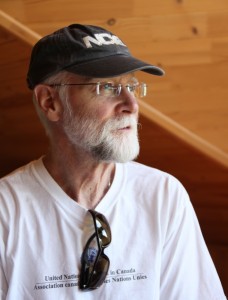Richard D Robarts (Canada):
B.Sc. (zoology), M.Sc. (microbiology), PhD (limnology – microbial ecology).
Current positions:
Board of Directors, World Water and Climate Change
Editor, Inkpot Scientific Editing
Previous positions (from 1976):
2009 – 2013 Project Director, Energy-Water Nexus project. School of Environment and Sustainability, University of Saskatchewan. Funded by Western Economic Diversification Canada ($750,500).
2009 – 2014 Adjunct Professor, School of Environment and Sustainability, University of Saskatchewan.
2004 – 2006 Director, Water Quality Monitoring Branch, National Water Research Institute (NWRI), Environment Canada, Saskatoon, Gatineau, and Burlington.
1998 – 2012 Director, UNEP GEMS/WATER Programme, c/o National Water Research Institute, Environment Canada, Saskatoon, Saskatchewan.
1997 – 2003 President and Co-founder, Safe Drinking Water Foundation (Canada).
1997 – 2005 Adjunct Professor/Research Director, Dept. of Biological Sciences, Napier University, U.K.
1997 – 2003 Member, Research Planning Committee, Sustainable Forest Management, Networks of Centres of Excellence, University of Alberta, Edmonton.
1995 – 2003 Adjunct Professor, Dept. of Biological Sciences, University of Alberta, Edmonton.
1993 – 2000 Project Leader, Wetlands Ecosystem Vulnerability Study, NHRI.
1992 – 1996 Member, NSERC Strategic Grants Committee, Oceans and Inland Waters Section.
1990 – 2004 Adjunct Professor, Dept. of Applied Microbiology and Food Science, University of Saskatchewan, Saskatoon.
1990 – 1998 Chief, Environmental Sciences Division, National Hydrology Division (NHRI), Environment Canada, Saskatoon, Saskatchewan, Canada.
1989 – 1990 Project Leader, Biological Response to Nutrients and Contaminants, Water Quality and Aquatic Science Division, NHRI, Environment Canada, Saskatoon, Saskatchewan, Canada
1988 ‑ 1990 Research Scientist 4, National Hydrology Research Institute.
1987 ‑ 1988 Program Manager, Microbial Fouling, Division of Water Technology, CSIR, Pretoria, South Africa.
1987 ‑ 1989 Project Leader, Bacterial production and organic carbon cycling in the lakes of sub‑Antarctic Marion Island.
1980 ‑ 1988 Chief Research Officer – Senior Specialist Research Officer, Limnology Division, National Institute for Water Research.
1978 ‑ 1980 Senior Aquatic Biologist, Schultz International Ltd., Vancouver, B.C., Canada.
1978 Free‑lance aquatic consultant
1976 ‑ 1977 Senior Aquatic Biologist, Beak Consultants, Toronto, Ontario.
Recent publications:
Castello, L., A.V. Zhulidov, T.Yu. Gurtovaya, R.D. Robarts, R.M. Holmes, D.A. Zhulidov, V.S. Lysenko,and R.G.M. Spencer. 2014. Low and declining biological mercury levels in Arctic Russian rivers. Environ. Sci. Technol. 48:747-752.
Fekete, B.M., U. Looser, and R.D. Robarts. 2012. River discharge is best monitored on the ground. J. Hydrometeorology 13(6):1977-1986.
Fekete, B.M., R.D Robarts, M. Kumagai, H.-P. Nachtnebel, E. Odada and A.V. Zhulidov. 2015. Time for In-situ renaissance. Science 349(6249): 685-686.
Goldman, C.R., M. Kumagai & R.D. Robarts (eds.). 2013. Effects of Climate Change and Variability on Inland Water Systems of the World. Wiley/Blackwell (E-version – Dec. 2012; Hardcopy, February 2013), 472 + xxiv p.
Guay, C.K.H. A.V. Zhulidov, R.D. Robarts, D.A. Zhulidov, T.Yu. Gurtovaya, R.M. Holmes and J.V. Headley. 2010. Measurements of Cd, Cu, Pb and Zn in the lower reaches of major Eurasian arctic rivers using trace metal clean techniques. Environmental Pollution 158:624-630.
Junk, W.J., A. Shuqing, H. Cízková, C. M. Finlayson, B. Gopal, S.A. Mitchell, W.J. Mitsch and R.D. Robarts. 2013. Current state of knowledge regarding the world’s wetlands and their future under global climate change: a synthesis. Aquatic Sciences 75:151-167. DOI 10.1007/s00027-012-0278-z
Robarts, R.D., A.V. Zhulidov and D.F. Pavlov. 2011. The State of knowledge about wetlands and their future under aspects of global climate change: The situation in Russia. Aquatic Sciences DOI 10.1007/s00027-011-0230-7. Hardcopy: 75(1):27-38 – doi:10.1007/s00027-011-0230-7.
Verma, B., R.D. Robarts and J.V. Headley. 2007. The effect of tetracycline on the colonization and growth of microbes on Scirpus lacustris litter in oligotrophic and eutrophic waters. Aquat. Microb. Ecol. 47:91-98.
Verma, B., R.D. Robarts and J.V. Headley. 2007. Impacts of tetracycline on planktonic bacterial production in prairie aquatic systems. Microb. Ecol. 54:52-55. (Published on-line, Dec. 2006).
Zhulidov, A.V., R.D. Robarts, D.F. Pavlov, J. Kämäri, T.Yu. Gurtovaya, J.J. Meriläinen and I.N. Pospelov. 2011. Long-Term Changes of Heavy Metal Concentrations in Ecosystems of the Taymyr Peninsula (Russian Federation) North of the Norilsk Industrial Complex. Environmental Monitoring and Assessment 181:539-553. (DOI 10.1007/s10661-010-1848-y).

